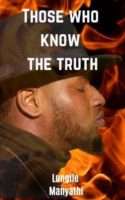Lelethu wakes up the following day with a stiff body and has to put in extra effort to drag herself to the kitchen. The wall clock reads nine am and the house is empty. She knows her father has already gone to work and a sticky note on the fridge explains her mother’s whereabouts – Gone to stokvel meeting.
Lelethu wolfs down a bowl of cornflakes, baths and pulls on a simple white dress. Braving the midday heat, she marches to Gogo Dinga’s house. She barges through the gate with enough force to make the hinges squeal. Ntando is at the far edge of the yard, tending to the garden. Lelethu’s rage eases as she draws closer. He is shirtless and there’s a large burn scar running down his back. She gasps.
“Dearest sister,” Ntando turns to her. “You’re not the one I was expecting.”
“That scar-”
“From the fire,” he cuts in, putting down a spade and wiping his hands on his trousers. “It’s a constant reminder.”
“Why are you here?” she asks.
“I have unfinished business,” he answers.
“You were in our yard last night, weren’t you?” Her rage sparks again.
Ntando smiles, momentarily bearing a striking resemblance to their father.
It dawns on her. “You’re trying to kill us.”
He shakes his head. “I’m not trying to kill you.”
“You started a fire!”
“That’s small compared to what I’ve seen,” he laughs. “I was hoping it would jog Solomon’s memory.”
“He honestly believes you died that night,” she explains.
His laughter ceases and he becomes serious again. “We need to change that, don’t we?”
“Please don’t be like this, Ntando,” she pleads, “I don’t know what happened that night but-”
“Lelethu, go home,” he interrupts her once again. “My battle is not with you.”
Lelethu tilts her head back, folds her arms across her chest and challenges his cold stare. The tension is instantly dissolved by the sound of Gogo Dinga’s back door creaking open. They watch her hobble out of the house towards them.
“How are you, Lelethu?” Gogo Dinga smiles warmly.
“I’m good, how are you Gogo?”
“Oh, I can’t complain about anything except these aching bones,” she chuckles.
“I need to get going,” Lelethu begins to back away.
“I was hoping you would come in for tea.” The old lady looks disappointed. “Hopefully, spend time with your brother.”
Lelethu and Ntando both huff at the suggestion and look at the ground to avoid eye contact.
“I’d rather not. Maybe some other time,” Lelethu says as she retreats to the gate.
*****
When Lelethu returns, her father is at home, stretched out on the couch and sorting through a stack of photographs. Lelethu greets him as she walks past, too drained by the heat to be curious.
He nods but doesn’t look up at her. “I don’t know how that fire started,” he says. Before she can respond, he continues. “By the time I got there, it was all up in flames. My store and my family. I was so sure I had lost everything.”
“I’m sorry.” She doesn’t know what else to say.
“Don’t be, Lele. Your mother was there for me every step of the way and then you came along. I don’t regret anything,” he draws in a deep breath, “I just don’t know what to make of these allegations that my son is alive.”
“How did you meet my mother?” She realises she had never thought about it before.
Her father smiles and quickly flips through the pictures. When he finds the one he is searching for, he holds it out to her. To her astonishment, it is a sepia-coloured Polaroid of her mother and her father’s first wife smiling at the camera.
“Your mother was my wife’s best friend and Ntando’s godmother. The grief of losing them brought us together,” he says.
Lelethu holds the picture for a long time, staring into the two smiling faces in the picture. It is a side of her mother that she could never have imagined – she looks plain and innocent.
Tell us: What do you think about Lelethu’s last words?


